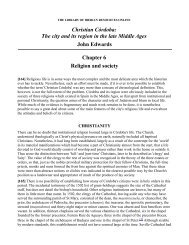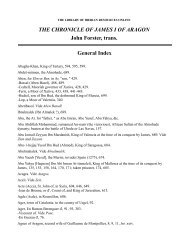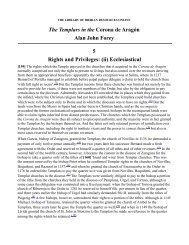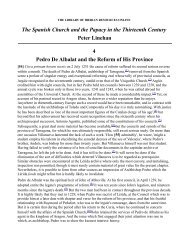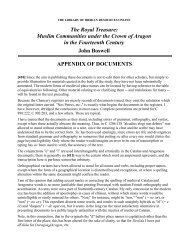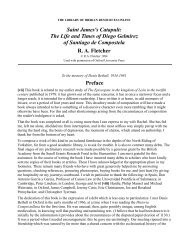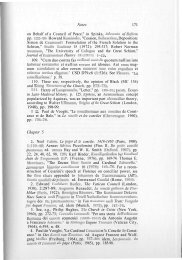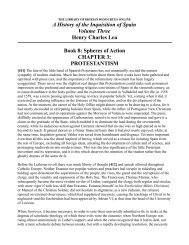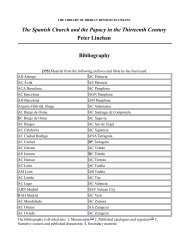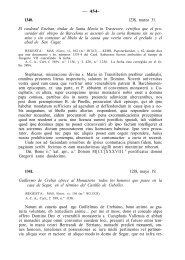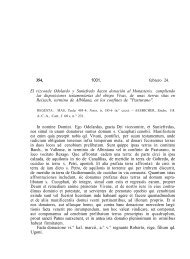Chapter 12 - The Library of Iberian Resources Online
Chapter 12 - The Library of Iberian Resources Online
Chapter 12 - The Library of Iberian Resources Online
You also want an ePaper? Increase the reach of your titles
YUMPU automatically turns print PDFs into web optimized ePapers that Google loves.
otation, <strong>of</strong> returning to the same point in the cycle.<br />
41. Markham (Report, p. 14) says that Makkarî called Murcia "al-Bostan." Compare references to the<br />
gardens (basâtîn) <strong>of</strong> Valencia in the Rawd al-mi'târ, Arabic text p. 47. See also the use <strong>of</strong> bustân in such<br />
expressions as shaykh al-bâsatîn (<strong>of</strong>ficer <strong>of</strong> the gardens) in the Ghûta <strong>of</strong> Damascus.<br />
42. Contribución, p. 290; Steiger derives it, through a metathesis, from wâqi', place (?).<br />
43. Musso, Riegos de Lorca, p. 30. In Iraq the waqt (pl. 'awqât), "time," is the period from sunrise to<br />
sunset, i.e., <strong>12</strong> hours (Fernea, Shaykh and Effendi, p. <strong>12</strong>5).<br />
44. Musso, Riegos de Lorca, pp 35-36; Brunhes, L'Irrigation, p. 261, n. 3.<br />
45. ARV, Procesos de Madrid, Letra S, 429.<br />
46. Pedro de Alcalá, Vocabulario, ed. Paul de Lagarde (Gottingen, 1883), p. 157.<br />
47. Marcelain Beaussier, Dictionnaire pratique arabe-français (Algiers, 1958) see under khait,<br />
48. Martínez Morellá, Cartas de los reyes de Castilla a Orihuela, p. 58 (May 14, <strong>12</strong>75). "E por fazer su<br />
<strong>of</strong>icio a todas las otras cosas que ouieron a fazer e que fagan limpiar las çequias e las filas e arrouas e<br />
los açarbes cada anyo de aquella acequia do fuere acequiero."<br />
49. Regarding "fila de dos hulls" see ARV, Gobernación, 2297, 11th hand, fol. 18v (in the rubric it is<br />
also called "cequia de dos hulls"); also AMC, Libres de Consell, Nov. 22, 25, 1460. For "files de la<br />
doberia" see AMC, Libres de Consell, 35 (Nov. 25, 1436), and for "files de Na Orellana" AMC, Libres<br />
de Consell for Feb. 21, 1473. Fila in this usage appears to be more typical <strong>of</strong> Castellón than <strong>of</strong><br />
Valencia.<br />
50. Pascual Madoz é Ibañez, Diccionario geográfico-estadístico-histórico de España, 16 vols (Madrid,<br />
1845--1850), I, 535. Regarding Riu dels Ulls: ulls, Castilian ojos (eyes), is a calc on the Arabic 'ayn,<br />
meaning both eye and spring; see Oliver Asín, Historia del nombre "Madrid," p. 172.<br />
51. Asín Palacios, Contribución a la toponimia árabe de España (Madrid, 1944), p. 58.<br />
52. With regard to the initial f and final t <strong>of</strong> fait: compare riego dalffayat, dalfayt with the forms <strong>of</strong><br />
"tailor" in the Repartimiento de Murcia (e.g., Johan Perez, alffayate, p. 163). A derivation from faid is<br />
less likely because Arabic final d almost always changes to d (and rarely to ç) but never to t (Steiger,<br />
Conrtibución, p. 164).<br />
53. Compare the toponyms, Almaguer (from al-maghîd) in Alginet, and Alcanar (Novelda), both<br />
meaning "<strong>The</strong> Canal"; Manuel Sanchis Guarner, Introducció a la história lingüística de Valencia<br />
(Valencia, 1950), p. 90, and Asín Palacios, Toponimia árabe, p. 66).<br />
54. <strong>The</strong>re are no phonetic problems in this proposed etymology. See Steiger, Contribución, p 272, for<br />
the loss <strong>of</strong> the interior ha (his illustration is from the same root, manhar into almenara). Nicolau<br />
Primitiu ("Salterio toponímico: Paiporta y Faitanar," Almanaque "Las Provincias" [1925], p. 201)<br />
proposed a derivation from a collective form (ending in ar) <strong>of</strong> faitana (parallel semantically to<br />
Castilian hacienda) in the sense <strong>of</strong> a country house. <strong>The</strong> derived form would be parallel to campanar,<br />
quintanar, etc. But faitana (which he should have written *faitana) is apparently just a conjecture <strong>of</strong><br />
Primitiu's (it does not appear in Alcover, Diccionari). <strong>The</strong> Murcian toponym Alfeitami (name <strong>of</strong> a<br />
diversion dam), could be a parallel case. It seems most likely a personal name (perhaps al-Fâtimi, "<strong>The</strong><br />
Fatimid," or its diminutive), but could be a form <strong>of</strong> khait al-mi, thread <strong>of</strong> water (cf. Pedro de Alcala, n<br />
46 above), which would be a close parallel to khait al-nahr.<br />
55. Repartimiento de Murcia, pp. 55, 157.<br />
56. Juan Torres Fontes, Medidas de superificie y de valoración en el Repartimiento de Murcia (Murcia,



